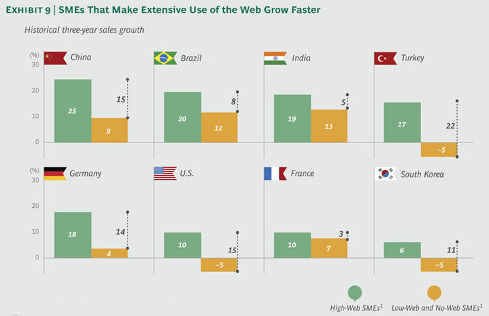Bikky Khosla | 02 Apr, 2013
How much promise the Internet holds for small businesses? Thousands, perhaps millions, of pages have been written about how the Internet is making its way to our lives. It is changing everything - the way we work, learn and play, and what is more, this is happening at a stunning pace - from a mere 3 million Internet users-base in 1990, today around 2,405 million people have access to it worldwide, and it is expected that there will be 3,000 million Internet users by 2016 -- almost half the world's population. How can small businesses afford not to have Internet presence?
There is another side of the story. While the Internet has exponential potential as a channel of commerce, its significance goes far beyond online buying or selling -- the Internet is changing the fundamental way of doing business, opening up opportunities abound for those who are embracing the changes while at the same time creating challenges for those who still lack, or choose not to have strategies designed keeping in mind how the nature of business is being transformed by the Internet. And this transformation, too, is happening fast and becoming deeper every day.
Now, let's now look at the findings of a recent survey, "The Internet Economy in the G-20: The $4.2 Trillion Growth Opportunity", conducted by global management consulting firm The Boston Consulting Group over the last 18 months.

Source: The Boston Consulting Group (BCG) [Survey of approximately 4,000 SMEs; BCG analysis]
Note: Figures for some countries may not add up to the totals due to rounding
The survey, with its sample size of 15, 000 small and medium enterprises (SMEs) that operate in some of the world's biggest economies, found that high-Web SMEs (SMEs that use a wide range of Internet tools to market, sell, and support customers, interact with suppliers, and empower employers) experienced 22% more revenue growth than that achieved by low-Web SMEs (SMEs that have a website or social networking site) and no-Web SMEs (they do not have a website).
What is even more compelling is that in some G20 economies like the US, Turkey and South Korea low-web SMEs suffered negative revenue growth in the range of 5-11% while their high - web counterparts registered revenue growth in the range of 10-17% for the three year period. In China, Brazil and India revenue growth of high-Web SMEs for the period stands at 25%, 20% and 19%, respectively against 5%, 12% and 13% revenue growth of their low-Web counterparts for the same period.
The survey also found that job generating prowess of high- and medium-Web SMEs is much higher - for example, in Germany only 50% of the non-Web small firms increased employment against 93% of high-Web and 82% of medium-Web SMEs. The report also adds that in many developed and developing economies, high-Web companies are twice as likely as their low- or no-Web counterparts to have a national and international customer base.
What these findings tell us is exactly what I have mentioned above -- the days are not far when denying to be a part of the Internet revolution would cost dearly to our SMEs. It is no longer an option, but a necessity. As of now, this may not seem so imperative but very soon they would have to make a choice -- either to embrace the inevitable and rise to the challenge of a new Internet driven marketplace, or stick to their old business models and be outpaced by their competition -- the first one is the right one, there's not an iota of doubt.